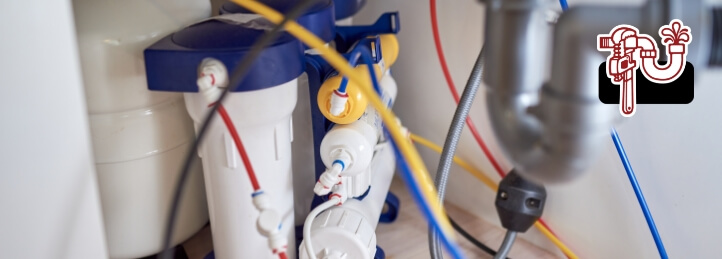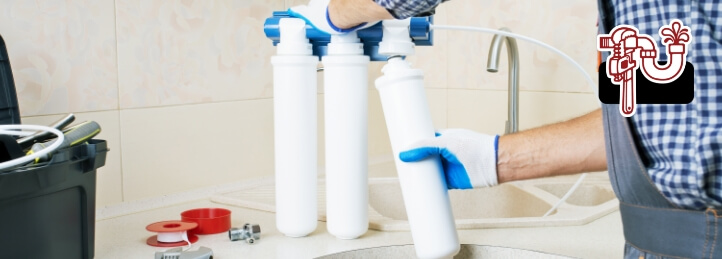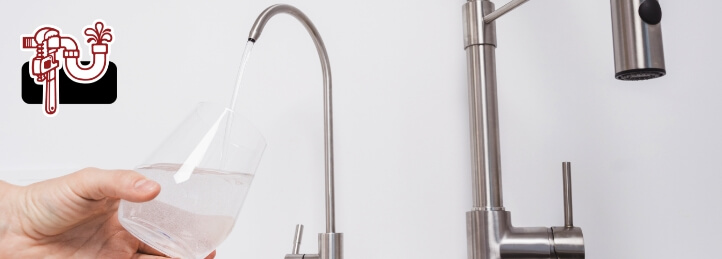Water Filtration Systems

Water filtration can be an incredible upgrade for your home. Water quality throughout the Kitsap Peninsula is a major issue. From reverse osmosis systems to a UV water purification unit, we’re happy to bring customers a wide variety of powerful systems that make your water clean and safe. Work with Swift Plumbing & Heating, a team that’s proud to bring you services that stand the test of time.
- An in-house apprenticeship program
- A team with a truly positive work environment
- Pride and professionalism with every job
It’s not just about upgrading your home to be more comfortable, it’s also about protecting your family from harmful contaminants like mold, bacteria, and volatile organic compounds that might do long-term damage.
Schedule an appointment today with our team to find out your Water Filtration options on Bainbridge Island, in Port Townsend and throughout the Kitsap Peninsula. Proud to be serving you, and proud to be Swift Plumbing & Heating!
How do you install a whole home water filtration system?
- Turn off the main water supply to your home
- Select an accessible location near where the water line enters the house
- Cut a section of the main pipe and install shut-off valves on both sides
- Mount the filter system and connect it inline using proper fittings and seals
- Turn the water back on, check for leaks, and flush the system
- Test water flow and filtration to ensure proper operation
Expert Water Filtration System Installation & Repair
Clean, purified water is essential for maintaining a healthy home. Yet, despite advancements in water treatment, contaminants still make their way into household water supplies. For those on well water, effective filtration systems are particularly crucial to ensure the safety and quality of drinking water. In this guide, we’ll explore three popular types of water filtration systems—UV light purification units, standard filters, and reverse osmosis filters—while detailing the benefits, contaminants they address, and how they can provide added security for well water users.
Benefits of Filtered Water
Filtering water provides numerous advantages beyond removing contaminants. Here are some of the benefits of installing a reliable water filtration system:
- Healthier Drinking Water: Removing harmful pathogens, chemicals, and metals from your water can improve overall health, reducing exposure to potential toxins and bacteria.
- Improved Taste and Odor: Contaminants like chlorine, sulfur, and minerals can cause unpleasant tastes and smells. Filtration enhances the overall quality of water, making it more enjoyable to drink and cook with.
- Appliance Longevity: Filtered water is gentler on appliances like dishwashers, washing machines, and coffee makers. By removing minerals and chemicals, a filtration system helps prolong the life of these appliances.
- Protects Plumbing: Hard water and certain contaminants can cause buildup in pipes, which may lead to costly repairs. Filtration systems reduce mineral deposits, preserving your plumbing over time.
- Environmental Benefits: Relying on filtered water at home reduces the need for bottled water, which can significantly cut down on plastic waste.
Whether you’re using municipal water or well water, a filtration system tailored to your water source can provide essential protection and peace of mind.

Exploring Different Types of Water Filtration Systems
Here are the types of water filtration systems you could upgrade your home to include. Just remember that professional installation can be faster, easier, and safer than trying to install these units yourself.
How UV Purification Units Work
UV (ultraviolet) light purification systems are an advanced and highly effective method for killing bacteria, viruses, and other pathogens in water. These systems are ideal for well water users, as they specifically target biological contaminants that are common in untreated water sources.
How UV Light Purification Works
UV systems use shortwave UV-C light to disrupt the DNA of microorganisms, rendering them inactive and unable to reproduce. This process effectively neutralizes bacteria, viruses, and protozoa, providing a safe and chemical-free way to purify water.
Benefits of UV Light Purification
- Effective Against Pathogens: UV purification eliminates up to 99.9% of bacteria and viruses, making it highly reliable for pathogen control.
- Chemical-Free Solution: Unlike chlorination, UV purification doesn’t add chemicals to the water, ensuring a pure taste.
- Minimal Maintenance: UV systems require only periodic bulb replacement, making them relatively easy to maintain.
Well water is often more susceptible to biological contaminants like E. coli and Giardia, especially if the well is shallow or near agricultural areas. UV systems offer well water users a reliable barrier against pathogens without altering the water’s natural properties.

Guide to Carbon and Sediment Water Filters
Standard filters are among the most common water filtration solutions and typically include activated carbon filters and sediment filters. Each filter type targets different contaminants, often working together in a multi-stage system for comprehensive filtration.
- Activated Carbon Filters: These filters trap organic chemicals, chlorine, pesticides, and volatile organic compounds (VOCs) using a process called adsorption. They’re particularly effective for improving water taste and odor.
- Sediment Filters: Designed to capture larger particles like sand, rust, and dirt, sediment filters serve as the first line of defense, preventing debris from reaching other filtration stages or the home’s plumbing.
Benefits of Standard Filters
- Versatile Contaminant Removal: Carbon filters can remove chlorine, lead, and other chemicals, while sediment filters handle larger impurities, offering broad-spectrum filtration.
- Enhanced Taste and Clarity: By removing chlorine, sulfur, and other contaminants, standard filters provide water that’s cleaner and more enjoyable.
- Customizable Options: Standard filters come in a variety of types and sizes, so they can be customized to match specific water quality needs.
Since well water can contain sediment, rust, and other particulates, sediment filters offer a significant advantage. When combined with carbon filters, they provide a solid solution for removing both physical impurities and chemical contaminants.
Benefits of Reverse Osmosis (RO) Water Filters
Reverse osmosis (RO) systems use a semi-permeable membrane to remove a wide range of contaminants. RO systems work by pushing water through this membrane, which filters out particles larger than water molecules. This technology is highly effective for removing dissolved solids, metals, and other contaminants.
How Reverse Osmosis Works: RO systems use pressure to force water through a multi-layer membrane that traps contaminants. After filtration, only purified water passes through, while contaminants are flushed out as waste.
Benefits of Reverse Osmosis
- Comprehensive Filtration: RO systems can remove up to 99% of dissolved solids, heavy metals, nitrates, and fluoride, providing high-purity water.
- Ideal for Taste and Health: RO systems are known for producing some of the purest, best-tasting water, ideal for drinking and cooking.
- Environmentally Friendly: While RO does produce some wastewater, many modern systems are designed to minimize this and can be paired with water-saving techniques.
Best for Well Water: Well water can often contain higher levels of minerals, heavy metals, and nitrates, making RO an ideal option. It’s particularly beneficial for households concerned about metals and high mineral content.
Contaminants Removed by Filtration Systems
Each type of water filtration system addresses different contaminants, ensuring comprehensive coverage when combined:
- UV Light Purification: Bacteria, viruses, protozoa (like Cryptosporidium and Giardia), and other pathogens.
- Standard Filters (Carbon and Sediment): Chlorine, sulfur, sediment, VOCs, lead, pesticides, rust, and other organic chemicals.
- Reverse Osmosis: Dissolved solids, heavy metals (like lead, arsenic, and mercury), nitrates, fluoride, and various chemicals.
For well water, which is more likely to contain sediment, pathogens, and heavy metals, using a combination of UV, standard, and RO filtration offers a comprehensive solution. Combining these systems can provide a tailored approach to protect against multiple types of contaminants effectively.
Special Water Filtration Needs for Well Water Homes
Since well water is not subject to the same treatment standards as municipal water, well water users should be particularly vigilant about filtration. Here are some of the unique challenges and how filtration systems can help:
- Biological Contaminants: Well water can harbor bacteria, viruses, and other pathogens. UV purification is highly recommended to eliminate these threats without the use of chemicals.
- Sediment and Minerals: Sediment, iron, and manganese are common in well water. Sediment filters and RO systems effectively reduce these particulates and dissolved minerals.
- Chemical Runoff: If the well is near agricultural or industrial areas, pesticides and chemicals can leach into the groundwater. Carbon filters and RO systems are well-suited to remove these contaminants.
Don’t forget about water softeners! Our team can install a powerful water softener to weed out sediments and minerals from your water that might otherwise harm your appliances or your plumbing system.
How to Know When to Replace Your Water Filter System
Water filtration systems don’t last indefinitely. Just like any appliance, they have a finite lifespan that varies based on the type, frequency of use, and water quality. Here are some factors that signal it’s time for a replacement:
- Age of the System: Most water filtration systems last between 10-15 years, depending on the model and maintenance. For example:
- Decline in Water Quality: If you notice a change in taste, smell, or clarity, it’s often a sign that your filtration system is no longer working effectively. Contaminants can slip through as filters degrade, particularly if there’s sediment buildup or biofilm on filters and membranes.
- Reduced Water Flow: Low water pressure can be a sign of clogged filters or malfunctioning components. If your water flow is consistently slower than normal, the filter system may be reaching the end of its effective lifespan.
- Increased Frequency of Repairs: If you’re frequently dealing with repairs, it may be more cost-effective to replace the system. As components age, they’re more likely to break down or malfunction, costing more over time in repairs and maintenance.
- Advances in Technology: Filtration technology has advanced significantly, with new systems designed for better energy efficiency and contaminant removal. For instance, newer reverse osmosis systems have lower waste rates, UV systems have longer-lasting bulbs, and advanced carbon filters are more effective at trapping contaminants.
- Updated Water Quality Standards: If your system was installed many years ago, it may not meet current water quality standards or effectively remove newly identified contaminants like PFAS (forever chemicals) or microplastics. Replacing an outdated system with a modern filtration system can provide enhanced protection.
Warning Signs Your Water Filtration System Needs Attention
Not all issues call for a complete replacement—some can be solved with repairs or component replacements. Here’s what to watch for to determine if your system could benefit from a tune-up or repair:
- Poor Water Taste or Odor: If your water begins to taste metallic, musty, or otherwise unpleasant, it’s likely that your filters are no longer effectively removing contaminants. Unpleasant odors, particularly a chlorine or sulfur smell, can also indicate that the filters or UV components aren’t working properly.
- Filter Change Indicators: Some systems include indicators or lights to signal when it’s time to replace filters. If these signals appear more frequently than expected, it could mean your water quality is fluctuating or that the filters are clogging prematurely, both of which may need further investigation.
- Frequent Filter Replacements: If you find yourself changing filters more often than the manufacturer recommends, there may be an issue with your water quality or pressure, or it could indicate that the system is struggling to handle your water’s contaminant load. In this case, a professional inspection may reveal underlying issues that require repair.
- Visible Sediment Buildup: If sediment is visibly accumulating on or around your system’s filters, it’s likely not capturing particles effectively. This buildup can lead to clogs and may indicate a need to flush, clean, or replace parts of the system.
- Leaking or Pooling Water: Leaks are often a sign of worn seals or damaged fittings, which can occur as systems age or when connections loosen. If you notice water pooling around your filtration system, addressing the source of the leak promptly is essential to prevent further damage.
- Unusual Noises: Water filtration systems are typically quiet, so any unusual sounds—like gurgling, banging, or whistling—could indicate a problem with water flow or pressure. Strange noises may suggest that air is trapped in the system or that the system’s components aren’t working as they should.











